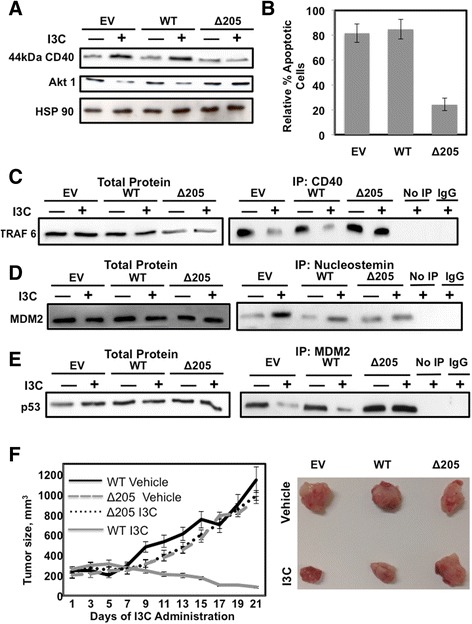Figure 8.

Elastase-dependent I3C apoptotic effects, regulation of protein–protein interactions, and inhibition of in vivo tumor xenografts. (A) 10AT-Her2 cells were transfected with either the EV, WT elastase expression vector or the ∆205 truncated elastase expression vector and treated with or without 200 μM I3C for 48 hours. Cell extracts were electrophoretically fractionated and probed by Western blot analysis for CD40, Akt1 and HSP90. (B) 10AT-Her2 cells were transfected with EV, WT or ∆205 expression vectors and treated with or without 200 μM I3C for 48 hours. The relative amount of apoptosis was quantified by the ratio of sub-G1 DNA contents as determined by flow cytometry of nuclear DNA stained with propidium iodide. The number of apoptotic cells observed after I3C treatment were normalized to DMSO-vehicle-control-treated cells. (C, D, E) 10AT-Her2 cells were transfected with EV, WT or ∆205 expression vectors and treated with or without 200 μM I3C for 48 hours. Total cell extracts were immunoprecipitated with either CD40 (C) nucleostemin (D) or MDM2 (E) antibodies. As controls, immunoprecipitations were carried out with non-immune antibodies (IgG) or not immunoprecipitated (No IP). Cell extracts were electrophoretically fractionated and probed by Western blot analysis using antibodies specific to tumor necrosis factor receptor activator factor-6 (TRAF6) (panel C), MDM2 (panel D) or p53 (panel E). (F) 10AT-Her2 cells were stably transfected with EV, WT or ∆205 expression vectors and 300,000 cells were used for xenograft injections of athymic mice. After the formation of detectable palpable tumor xenografts, athymic mice were treated subcutaneously with either 300 mg/kg of I3C or the DMSO vehicle control. Tumor volumes were quantified with a caliper from ten tumor xenografts per condition using two tumor sites per animal. The micrograph insert shows representative tumors excised from 2-week-post-injection animals. DMSO, dimethyl sulfoxide; EV, empty expression vector; I3C, indole-3-carbinol; IgG, immunoglobulin G; IP, immunoprecipitated; MDM2, murine double mutant 2; TRAF6, tumor necrosis factor receptor activator factor-6; WT, wild type.
